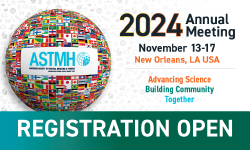| Past two years | Past Year | Past 30 Days | |
|---|---|---|---|
| Abstract Views | 351 | 144 | 17 |
| Full Text Views | 4 | 1 | 0 |
| PDF Downloads | 3 | 2 | 0 |
Antigenic Diversity Found in Isolates of Plasmodium Falciparum from Papua New Guinea by using Monoclonal Antibodies
Search for other papers by Graham Knowles in
Current site
Google Scholar
PubMed
Search for other papers by Wendy L. Davidson in
Current site
Google Scholar
PubMed
Search for other papers by Jana S. McBride in
Current site
Google Scholar
PubMed
Search for other papers by Damien Jolley in
Current site
Google Scholar
PubMed
Monoclonal antibodies were used to demonstrate antigenic diversity in over 100 primary isolates of Plasmodium falciparum collected from one area of Papua New Guinea. The frequencies of several parasite antigens in our sample is calculated. One particular antigen which had previously been shown to be absent in one-third of established isolates collected from several countries appeared ubiquitous in our sample from Papua New Guinea. A method is presented that can be used to test for associations between antigens; the analysis also reveals whether other variables affect these associations. Several associations between antigens were revealed. In one instance, the association between two particular parasite antigens was affected by the donor's age. The importance of characterizing the antigenic structure of P. falciparum populations, and its relevance to the introduction of an antimalarial vaccine are discussed.
Author Notes
| Past two years | Past Year | Past 30 Days | |
|---|---|---|---|
| Abstract Views | 351 | 144 | 17 |
| Full Text Views | 4 | 1 | 0 |
| PDF Downloads | 3 | 2 | 0 |








